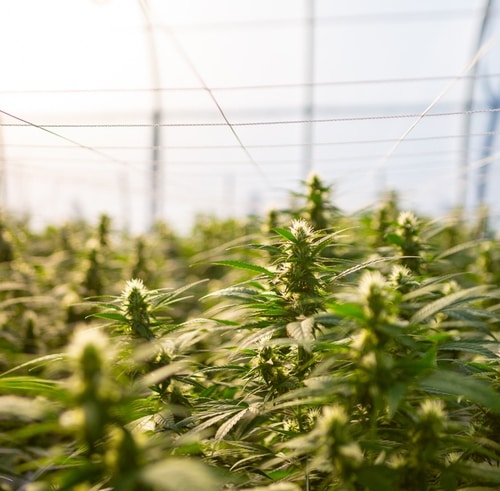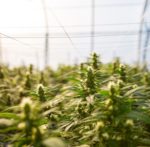National Agriculture Day (March 23, 2021), is an annual event held by the Agriculture Council of America (ACA), a not-for-profit 501-c (6) organization, to increase the public awareness of agriculture’s vital role in our society.
 The ACA believes that every American should:
The ACA believes that every American should:
- Understand how food and fiber products are produced.
- Appreciate the role agriculture plays in providing safe, abundant and affordable products.
- Value the essential role of agriculture in maintaining a strong economy.
- Acknowledge and consider career opportunities in the agriculture, food and fiber industry.
We investigated how the hemp and cannabis industry is disrupting agriculture in positive ways, from automated trimming, to controlled environment agriculture, to water conservation and beyond. We interviewed Aaron McKellar, CEO and President of Eteros Technologies, parent company of Mobius Trimmer and Triminator, Mark Doherty, Executive Vice President of Operations, urban-gro, Inc. and Derek Smith, Executive Director at Resource Innovation Institute (RII) to get their perspective on agricultural innovation.
Aaron McKellar, CEO and President of Eteros Technologies
Aaron Green: Why is hand-trimming inefficient at scale?
Aaron McKellar: Hand-trimming is inefficient at scale because it is so labor-intensive and time-consuming, not to mention repetitive and frankly boring. It’s hard to stay fully engaged as a worker trimming by hand, so the consistency of your finished product isn’t reliable with a crew of hand-trimmers.

A hand-trimmer can produce good quality trim on about 2 or 3 pounds per day. A scaled-up facility running just one Mobius M108S Trimmer can realize up to 120 pounds per hour, replacing many dozens, or even into the hundreds of hand-trimmers. The HR nightmare this presents, and all the associated costs of paying and facilitating dozens of employees (parking, washrooms, lunchrooms, PPE and gowning, etc) is simply unworkable. And that’s before COVID.
Green: How does automated trimming benefit large producers and how does the quality compare to hand-trimming?
McKellar: Not all automated trimmers are created equal. Any of the machines out there will help to reduce the need for hand-trimmers by taking off the bulk of the leaf, leaving a small team of “hand-polishers” to finish it up. The Mobius Trimmer is the only automated trimmer on the market today that leaves the technology of the original machines in the past and employs next-gen technology to truly mimic hand-trimmed quality with stunning through-put rates.
We have high-end producers using Mobius Trimmers whose own QC department cannot discern Mobius-trimmed flower from hand-trimmed flower. Hand polishing crews tend to be far smaller when using a Mobius vs first-gen machinery, and many Mobius users don’t touch up at all, instead going straight to market right out of the trimmer. For a look at how our technology differs from the rest of the field, check out this look under the hood.
Mark Doherty, Executive Vice President of Operations, urban-gro, Inc.
Aaron Green: What is controlled environment agriculture?
Mark Doherty: Cannabis cultivators understand growing indoors because, prior to legalization, they had been doing it for years in the gray market. It is by way of that experience that cultivators learned how to manipulate a highly-valuable, complex plant in an indoor setting. As cannabis legalization spread across the United States, many government regulators required that it be cultivated indoors according to strict regulatory protocols. Fast forward 10 years, and we have an industry that is keenly aware of the indoor environmental conditions required to be successful. Critical factors like heating, cooling, ventilation, dehumidification, and how to best mimic Mother Nature’s energy through lighting are all deliberately optimized.

With cannabis cultivation driving the advancements of controlled environment agriculture, market and regulatory forces demanded higher efficiency, reduced energy and resource consumption, and clean crops. In most states, cannabis crops have more stringent testing than food crops. For instance, the lettuce in Massachusetts will not pass the standards for cannabis in Massachusetts. It’s through rapid innovation and technology adoptions that the cannabis industry has paved the way for lettuce to be profitably grown indoors.
Green: How can controlled environment agriculture help alleviate supply chain stresses?
Doherty: By growing food closer to the consumer, you reduce food miles; meaning, that link in the food supply chain gets a lot shorter and is less prone to disruption. Whether you have hyper small cultivation facilities on every street corner, or a larger cultivation facility geographically close to consumers, you can grow 24/7/365. Furthermore, growing locally allows for better prediction of facility output—10 boxes of greens on Monday, 50 boxes of greens on Tuesday, and five boxes of greens on Thursday. This eliminates harvesting a large crop before it is ripe and likely requiring cold storage. The controllability of controlled environment ag is that consistent, reliable contribution to the food supply chain and shortening that path to the consumer.
Derek Smith, Executive Director at Resource Innovation Institute (RII)
Aaron Green: What motivated you to publish the Cannabis H2O: Water Use and Sustainability in Cultivation report?

Derek Smith: Until this report, if you searched for cannabis water usage, you’d basically find one cited statistic. It was “six gallons per plant per day.” We knew this was from a model based on one extreme illicit market scenario. Based on the data we were seeing and the conversations we were having, this number seemed way off. So, we pulled together a multidisciplinary Water Working Group as part of our Technical Advisory Council. The objective of the Water Working Group was to establish a scientific understanding of how, and how much, water is used for cannabis cultivation so that cultivators have confidence in taking steps to be more efficient, and so that industry leaders, governments and media can be accurately informed about the range of water practices of today’s regulated market.
Green: What key points should cannabis cultivators take away from the report? What key points should regulators and policymakers take away from the report?
Smith: As the cannabis industry matures, water use efficiency will become more important, as it has for other agricultural crops. Pressures to use water efficiently will mount from multiple channels including – reducing input and energy cost, protecting the environment, meeting regulatory standards and simply being good stewards. We recommend that industry and regulators focus efforts on the following areas:
- When grown outdoors, water for cannabis production should be assessed like any other agricultural crop and be subject to state and local regulations that apply to other crops. Our research indicates that cannabis neither uses a massive share of water nor uses more water than other agricultural crops. Applying the same standards to cannabis as to other agricultural crops will correctly categorize outdoor grown cannabis as an agricultural crop.
- In areas where there may be conflict between water use for cannabis and environmental concerns, regulators and the industry should focus (1) on the timing of water use and (2) the potential of storage to mitigate environmental conflict. Our results show that in many parts of the country legal cannabis farmers have ample water storage to satisfy their needs. In areas where storage is insufficient, increasing storage should be a priority for farmers and regulators.
- Our research shows there are still massive differences between cannabis production techniques. As farmers continue to experiment and improve, we expect to see water use be a more important part of cannabis farming decisions and expect new plant varieties and growing techniques to be developed that increase water use efficiency. Yet more data from actual farms and facilities are needed to point the way toward the technologies and techniques that drive optimal efficiency and productivity. It is recommended that producers benchmark their performance and governments consider requiring energy and water reporting by producers. The Cannabis PowerScore can assist in these efforts.
- As indoor production continues to grow, especially in areas that have unfavorable climatic conditions for outdoor growing, we expect more cannabis users to rely on municipal water sources. Yet, it is unclear if municipal water suppliers are equipped to work with the cannabis industry. We suggest outreach efforts between the cannabis industry and municipal water suppliers to incentivize efficiency where possible.




















